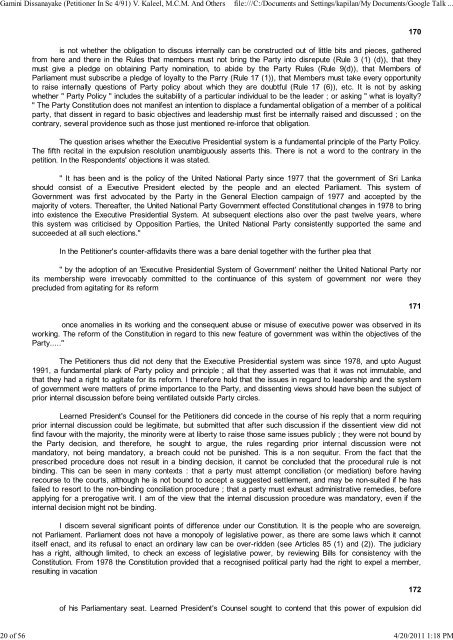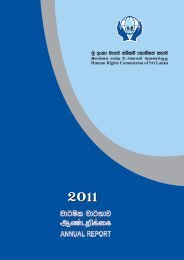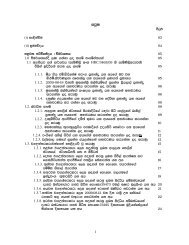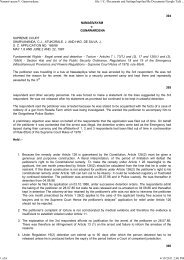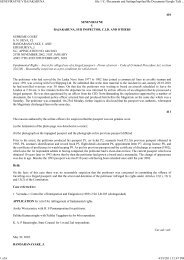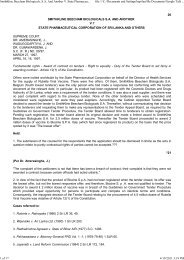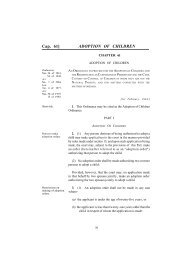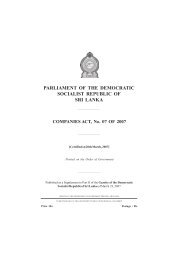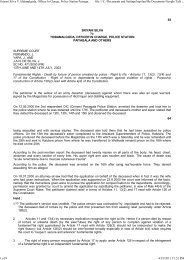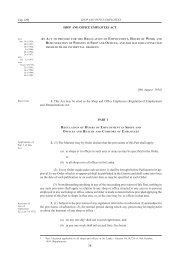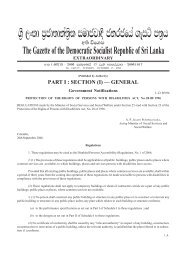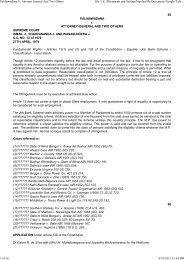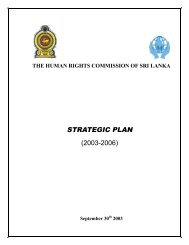Gamini Dissanayake (Petitio... - Human Rights Commission of Sri ...
Gamini Dissanayake (Petitio... - Human Rights Commission of Sri ...
Gamini Dissanayake (Petitio... - Human Rights Commission of Sri ...
You also want an ePaper? Increase the reach of your titles
YUMPU automatically turns print PDFs into web optimized ePapers that Google loves.
<strong>Gamini</strong> <strong>Dissanayake</strong> (<strong>Petitio</strong>ner In Sc 4/91) V. Kaleel, M.C.M. And Others file:///C:/Documents and Settings/kapilan/My Documents/Google Talk ...<br />
is not whether the obligation to discuss internally can be constructed out <strong>of</strong> little bits and pieces, gathered<br />
from here and there in the Rules that members must not bring the Party into disrepute (Rule 3 (1) (d)), that they<br />
must give a pledge on obtaining Party nomination, to abide by the Party Rules (Rule 9(d)), that Members <strong>of</strong><br />
Parliament must subscribe a pledge <strong>of</strong> loyalty to the Parry (Rule 17 (1)), that Members must take every opportunity<br />
to raise internally questions <strong>of</strong> Party policy about which they are doubtful (Rule 17 (6)), etc. It is not by asking<br />
whether " Party Policy " includes the suitability <strong>of</strong> a particular individual to be the leader ; or asking " what is loyalty?<br />
" The Party Constitution does not manifest an intention to displace a fundamental obligation <strong>of</strong> a member <strong>of</strong> a political<br />
party, that dissent in regard to basic objectives and leadership must first be internally raised and discussed ; on the<br />
contrary, several providence such as those just mentioned re-inforce that obligation.<br />
The question arises whether the Executive Presidential system is a fundamental principle <strong>of</strong> the Party Policy.<br />
The fifth recital in the expulsion resolution unambiguously asserts this. There is not a word to the contrary in the<br />
petition. In the Respondents' objections it was stated.<br />
" It has been and is the policy <strong>of</strong> the United National Party since 1977 that the government <strong>of</strong> <strong>Sri</strong> Lanka<br />
should consist <strong>of</strong> a Executive President elected by the people and an elected Parliament. This system <strong>of</strong><br />
Government was first advocated by the Party in the General Election campaign <strong>of</strong> 1977 and accepted by the<br />
majority <strong>of</strong> voters. Thereafter, the United National Party Government effected Constitutional changes in 1978 to bring<br />
into existence the Executive Presidential System. At subsequent elections also over the past twelve years, where<br />
this system was criticised by Opposition Parties, the United National Party consistently supported the same and<br />
succeeded at all such elections."<br />
In the <strong>Petitio</strong>ner's counter-affidavits there was a bare denial together with the further plea that<br />
" by the adoption <strong>of</strong> an 'Executive Presidential System <strong>of</strong> Government' neither the United National Party nor<br />
its membership were irrevocably committed to the continuance <strong>of</strong> this system <strong>of</strong> government nor were they<br />
precluded from agitating for its reform<br />
once anomalies in its working and the consequent abuse or misuse <strong>of</strong> executive power was observed in its<br />
working. The reform <strong>of</strong> the Constitution in regard to this new feature <strong>of</strong> government was within the objectives <strong>of</strong> the<br />
Party....."<br />
The <strong>Petitio</strong>ners thus did not deny that the Executive Presidential system was since 1978, and upto August<br />
1991, a fundamental plank <strong>of</strong> Party policy and principle ; all that they asserted was that it was not immutable, and<br />
that they had a right to agitate for its reform. I therefore hold that the issues in regard to leadership and the system<br />
<strong>of</strong> government were matters <strong>of</strong> prime importance to the Party, and dissenting views should have been the subject <strong>of</strong><br />
prior internal discussion before being ventilated outside Party circles.<br />
Learned President's Counsel for the <strong>Petitio</strong>ners did concede in the course <strong>of</strong> his reply that a norm requiring<br />
prior internal discussion could be legitimate, but submitted that after such discussion if the dissentient view did not<br />
find favour with the majority, the minority were at liberty to raise those same issues publicly ; they were not bound by<br />
the Party decision, and therefore, he sought to argue, the rules regarding prior internal discussion were not<br />
mandatory, not being mandatory, a breach could not be punished. This is a non sequitur. From the fact that the<br />
prescribed procedure does not result in a binding decision, it cannot be concluded that the procedural rule is not<br />
binding. This can be seen in many contexts : that a party must attempt conciliation (or mediation) before having<br />
recourse to the courts, although he is not bound to accept a suggested settlement, and may be non-suited if he has<br />
failed to resort to the non-binding conciliation procedure ; that a party must exhaust administrative remedies, before<br />
applying for a prerogative writ. I am <strong>of</strong> the view that the internal discussion procedure was mandatory, even if the<br />
internal decision might not be binding.<br />
I discern several significant points <strong>of</strong> difference under our Constitution. It is the people who are sovereign,<br />
not Parliament. Parliament does not have a monopoly <strong>of</strong> legislative power, as there are some laws which it cannot<br />
itself enact, and its refusal to enact an ordinary law can be over-ridden (see Articles 85 (1) and (2)). The judiciary<br />
has a right, although limited, to check an excess <strong>of</strong> legislative power, by reviewing Bills for consistency with the<br />
Constitution. From 1978 the Constitution provided that a recognised political party had the right to expel a member,<br />
resulting in vacation<br />
<strong>of</strong> his Parliamentary seat. Learned President's Counsel sought to contend that this power <strong>of</strong> expulsion did<br />
20 <strong>of</strong> 56 4/20/2011 1:18 PM<br />
170<br />
171<br />
172


